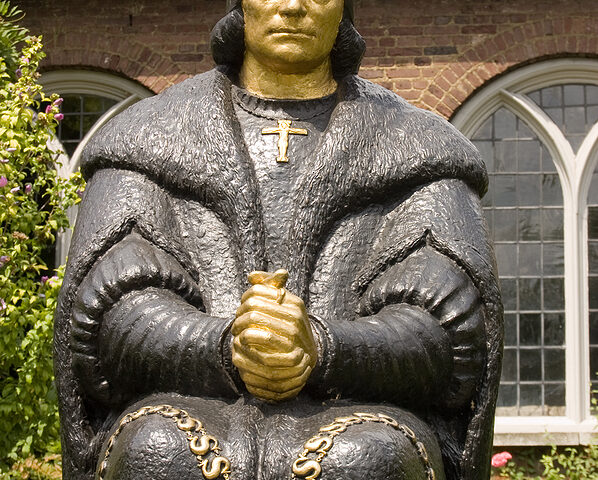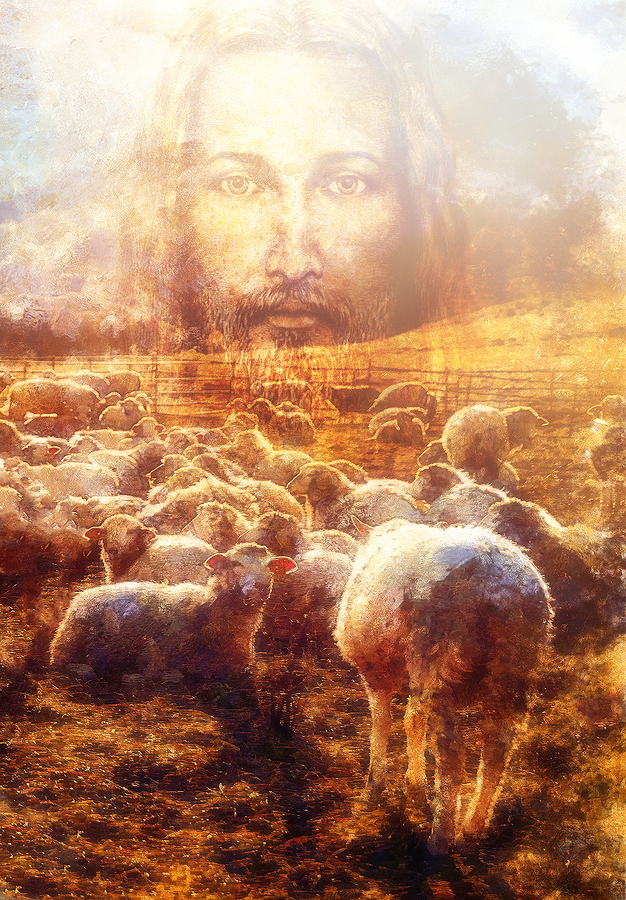
The Patron Saint of Politicians: Thomas More
In the year 2000, then Pope John Paul ll declared that many leaders of nations, states, and governments had asked him to proclaim Saint Thomas More the Patron of Statesmen and politicians. The Pope’s Apostolic Letter which details the proclamation, begins:
The life and martyrdom of Saint Thomas More have been the source of a message which spans the centuries and which speaks to people everywhere of the inalienable dignity of the human conscience…Precisely because of the witness which he bore, even at the price of his life, to the primacy of truth over power, Saint Thomas More is venerated as an imperishable example of moral integrity. And even outside the Church, particularly among those with responsibility for the destinies of peoples, he is acknowledged as a source of inspiration for a political system which has as its supreme goal the service of the human person….This harmony between the natural and the supernatural is perhaps the element which more than any other defines the personality of this great English statesman: he lived his intense public life with a simple humility marked by good humour, even at the moment of his execution.
Why would modern day government leaders relate to More, the patron saint of politicians, who lived and died in the sixteenth century?
What relevance does a medieval feudal figure have for twenty-first century democracies?
There’s no comparison bewteen us and the 16th century, so why the interest in the drama of King Henry V?
CS Lewis provides one answer:
I am a democrat [proponent of democracy] because I believe in the Fall of Man. I think most people are democrats for the opposite reason. A great deal of democratic enthusiasm descends from the ideas of people like Rousseau, who believed in democracy because they thought mankind so wise and good that everyone deserved a share in the government. The danger of defending democracy on those grounds is that they’re not true. And whenever their weakness is exposed, the people who prefer tyranny make capital out of the exposure… The real reason for democracy is just the reverse. Mankind is so fallen that no man can be trusted with unchecked power over his fellows. —C.S. LewisPresent Concerns
More was beheaded because he refused to sign the Oath of Supremecy: the declaration that the King of England was Supreme Governor of the Church of England, irrevocably breaking with Roman Catholicism. And freeing King Henry Vlll to marry Anne Boyelyn.
More’s last words: “I am the king’s good servant but God’s first.”
It’s election time again in America.
And even those like me who stay as far away from the news as possible, am taking this election seriously. The yawning abyss that separates candidates makes our vote important, if not critical. So, I am thinking about the patron saint of politicians-Thomas More. And I’m praying for More’s intercession to enlighten the consciences of the long list of men and women competing for office across the country.
I “met” Thomas More in an English literature class through the lens of Robert Bolt. One of the more successful playwrights of the last century, Bolt wrote the screenplays for Lawrence of Arabia, Dr. Zhivago, and The Mission. But it was A Man For All Seasons for which he was best known. During those classes, I read the play. And found myself yearning for Something or Someone I loved so much that I would die for it.
Like he did.
Norfolk: I’m not a scholar, as Master Cromwell never tires of pointing out, and frankly I don’t know whether the marriage was lawful or not. But damn it, Thomas, look at those names… You know those men! Can’t you do what I did, and come with us for friendship?
More: And when we stand before God, and you are sent to Paradise for doing according to your conscience, and I am damned for not doing according to mine, will you come with me, for friendship?
Cranmer: So those of us whose names are there are damned, Sir Thomas?
More: I don’t know, Your Grace. I have no window to look into another man’s conscience. I condemn no one.
Cranmer: Then the matter is capable of question?
More: Certainly.
Cranmer: But that you owe obedience to your King is not capable of question. So weigh a doubt against a certainty — and sign.
More: Some men think the Earth is round, others think it flat; it is a matter capable of question. But if it is flat, will the King’s command make it round? And if it is round, will the King’s command flatten it? No, I will not sign.
This person portrayed so vividly by Bolt, springs to life from the pages of the screenplay.
That he’d lived and died 500 years ago matters not one jot. The yearning we feel for the love he described to his daughter Meg is tangible. We can touch it.
Here’s the conversation I refer to:
MARGARET “Then say the words of the oath and in your heart think otherwise.”
MORE “What is an oath then but words we say to God?”
MARGARET “That’s very neat.”
MORE “Do you mean it isn’t true?”
MARGARET “No, it’s true.”
MORE “Then it’s a poor argument to call it “neat,” Meg. When a man takes an oath, Meg, he’s holding his own self in his own hands. Like water. (He cups his hands) And if he opens his fingers then-he needn’t hope to find himself again. Some men aren’t capable of this, but I’d be loathe to think your father one of them.”
MARGARET “In any State that was half good, you would be raised up high, not here, for what you’ve done already. It’s not your fault the State’s three-quarters bad. Then if you elect to suffer for it, you elect yourself a hero.”
MORE “That’s very neat. But look now . . . If we lived in a State where virtue was profitable, common sense would make us good, and greed would make us saintly. And we’d live like animals or angels in the happy land that needs no heroes. But since in fact we see that avarice, anger, envy, pride, sloth, lust and stupidity commonly profit far beyond humility, chastity, fortitude, justice and thought, and have to choose, to be human at all . . . why then perhaps we must stand fast a little-even at the risk of being heroes.”
MARGARET (Emotionally) “But in reason! Haven’t you done as much as God can reasonably want?”
MORE “Well . . . finally . . . it isn’t a matter of reason; finally it’s a matter of love.”
Thomas More was surrounded by religious men like himself.
Like Archbishop Cranmer and Thomas Cromwell, More served his sovereign king with the heart of a patriot. And like them, More was ambitious, he enjoyed the luxuries and privileges of being a confidante and trusted advisor of the king. Like them too, More had spent his life learning how to use the law of the land to his and his family’s advantage.
But in one area, he was wholly unlike them. Playwright Bolt explains.
At any rate, Thomas More, as I wrote about him, became for me a man with an adamantine sense of his own self. He knew where he began and left off, what area of himself he could yield to the encroachments of his enemies, and what to the encroachments of those he loved. It was a substantial area in both cases for he had a proper sense of fear and was a busy lover. Since he was a clever man and a great lawyer he was able to retire from those areas in wonderfully good order, but at length he was asked to retreat from that final area where he located his self. And there this supple, humorous, unassuming and sophisticated person set like metal, was overtaken by an absolutely primitive rigour, and could no more be budged than a cliff.A Man for All Seasons
I wrote in a piece a while back that not only do I think we have friends in heaven but that I wondered if they choose us. I say this because these people like Thomas More show up at precisely the right time. During those years at that precious Dominican college in Houston, I was lost. No matter how hard I worked to figure stuff out, the answer eluded me. And did so for many years to come.
And yet, these people show up, like a lighhouse.
More’s words written from the Tower, not long before his death are precious gems not just to statesmen and politicians, but to us all.
….”I will not mistrust him, Meg, though I shall feel myself weakening and on the verge of being overcome with fear. I shall remember how Saint Peter at a blast of wind began to sink…Margaret, I know this well: without my fault he will not let me lost…do not let your mind be troubled by anything that shall happen to me in this world. Nothing can come but what God wills. And I am very sure that whatever that be, however bad it may seem, it shall indeed be the best.”A Man for all Seasons

esus The Good Shepherd, Jesus and lambs.
A PS from Bishop Barron
on the first reading of the Christian liturgy for October 30, 2022.
Creation is happening now.
NOW! God did NOT stop creating when He created the heavens and the earth. When we open our eyes to see the creatures, divinity…It’s all is the overflowing, overwhelming expression of being “loved into existence!”
Even you and me!
And then, there’s the Gospel story of the sinner on steroids—Zaccheus—whose ‘one little spark’ of interest in Jesus floods his house with grace.
Wowza!




Listened to the “Man for All Seasons” in high school. I pity our dear instructor. As a clueless 15 year old I just didn’t get it. So grateful we have a patient and loving God who never gives up on us.
Wowza is right! Loved into being. Praying I remember this.
Me too, Mary, me too!